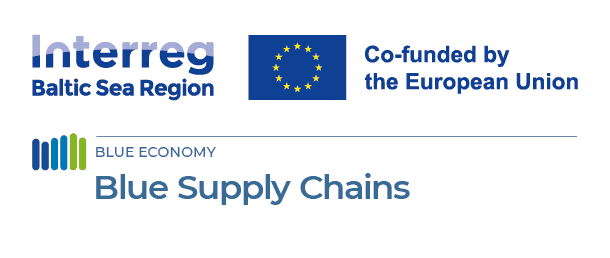
Final conference of the Swedish Blue Supply Chains Cluster
23 October 2025
An international audience gathered in Umeå to share, discuss, and celebrate the results achieved by the Swedish project partners within the Blue Supply Chains project.
The shipping industry faces an urgent and complex challenge: reducing its dependency on fossil fuels. While other sectors are actively decarbonizing, maritime transport remains a laggard, still relying on conventional fossil fuels for over 99% of its energy consumption. Given that global shipping accounts for nearly 3% of total greenhouse gas (GHG) emissions, failing to act could significantly hinder international climate goals.
The Challenge – decarbonising maritime transport!
Ports play a critical role in enabling this transition. They are not just gateways for goods but potential hubs for energy transformation. By facilitating the shift towards alternative fuels and green technologies, ports can support the transition of the entire sector.
A testbed covering the Swedish port landscape has been established to develop a national green bunkering and charging strategy for ports. As a first step, an in-depth analysis provided a detailed understanding of the current situation and future needs across the entire port landscape.
The Swedish pilot demonstrated practical pathways for decarbonising shipping and port operations – from assessing alternative marine fuels such as methanol, LBG, and electrification to developing the business cases and governance models required for long-term green investments.
The outcomes paved the way for the development of a methodology supporting the establishment of green bunkering strategies for regional port development. This is where Port of Umeå came into focus. The steps taken and the methodology applied were successfully tested, resulting in a roadmap for the Umeå region, which can serve as a blueprint for other ports.
Check our webpage to find the methodology and guidance on how to apply it.
The event brought together experts from ports, shipping companies, and public administrations to discuss how innovation, collaboration, and smart governance can drive the maritime sector toward a fossil-free future. During the conference, participants explored:
- How Umeå and Västerbotten are shaping the next generation of sustainable maritime logistics
- The role of European cooperation in accelerating the green transition in ports
- Insights from Wasaline, Port of Hamburg, and Umeå Energi on innovation, energy systems, and cross-border collaboration
In summary, the testbed has successfully proven its ability to build capacity and a strong local voice in Umeå – both critical for future implementation actions.
It also clearly demonstrated the importance of cooperation, knowledge exchange, and joint learning in paving the way for the green maritime transition.











